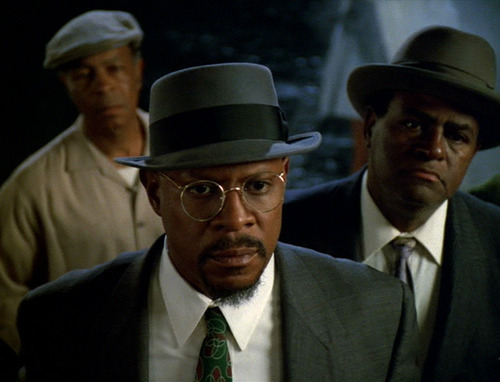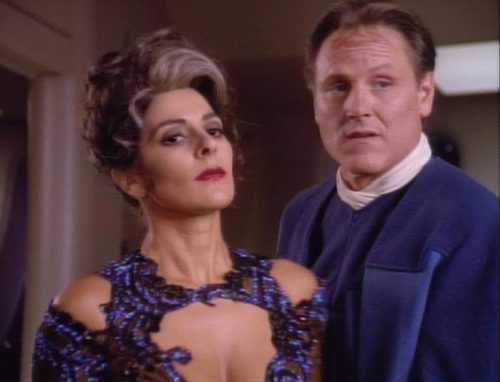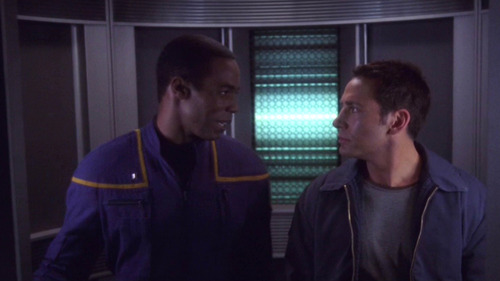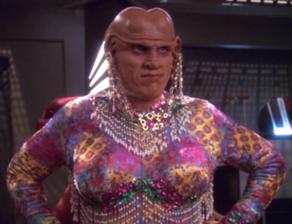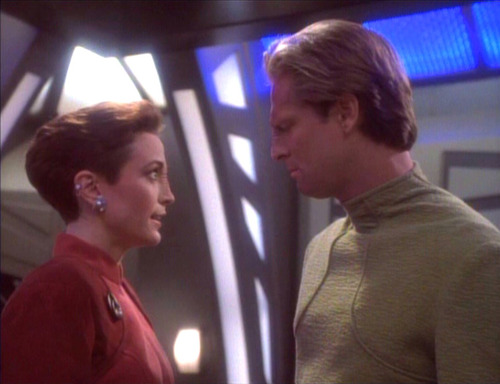“Far Beyond the Stars” is one of my favourite episodes of all time – one of the ones that every time I watch it, I appreciate it more. It fits in the club with other Trek “message” episodes – it tackles racism, and sexism to a lesser extent – but is one of the most creative and nuanced, so it doesn’t come off feeling at all like an after-school special.
The other thing that’s so important for this episode is that it gives much-needed context to the show’s usual diversity. Right from TOS on, there have been fairly diverse casts but relatively little context to tell contemporary viewers why that’s so important. Racism and sexism might not be big deals in the 24th century, but they sure as hell were in the 1960s, and of course still today.
This episode goes a ways to bridging the gap between today and the more equal Roddenberry vision of the future.
We start out in Sisko’s ready room, where he’s brooding over a friend’s ship disappearing while patrolling the Cardassian border. Joseph Sisko comes in and tries to help his son, who’s experiencing a bit of a crisis.
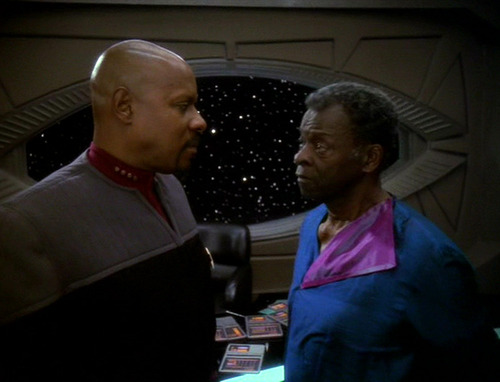
Joseph: Just say it, son.
Sisko: I don’t know how much more I can take. I don’t know how many more friends I can lose. Every time I achieve a real victory, something like this happens and everything seems to turn to ashes.
Joseph: So what do you want to do?
Sisko: Maybe it’s time for me to step down, let someone else make the tough calls.
As they talk, Sisko glances out the door and thinks he sees a man in a fedora. He walks out of the room and asks who the man was, but no one else saw anything.
As he’s walking back to his quarters with Kasidy later, he has another vision. This time, it’s a black baseball player walking past and asking if he saw the game. He goes into a room and Sisko follows him.
Suddenly he’s in the middle of a New York street, and about to get hit by a taxi.
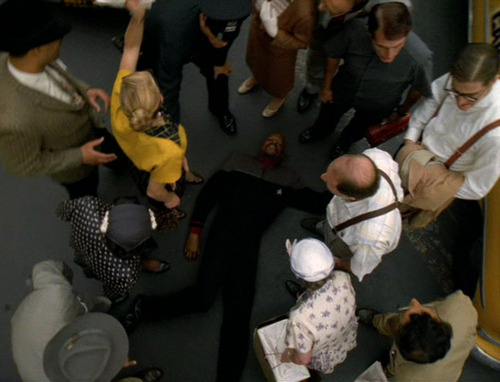
In the Infirmary, Sisko wakes up with his family and Doctor Bashir around him. Bashir says it looks like he’s experiencing visions like the ones he had the previous year and he’ll need to stay for observation.
But!
He’s now back in 1950s New York, this time dressed in period-appropriate garb. This is Benny Russell, a writer for the science fiction magazine Incredible Tales.
In the office we meet his coworkers, who are all played by the regular DS9 actors. There’s Albert (Colm Meaney), the slightly bumbling writer who only writes about robots (apparently an homage to Isaac Asimov); Julius (Alexander Siddig); Kay (Nana Visitor), who has to write under the name K.C. Hunter to disguise her gender; and later Darlene (Terry Farrell), the ditzy secretary/episode’s comic relief.

In addition, there is Herb (played by Armin Shimerman) and the boss, Douglas, played by Rene Auberjonois. The two present opposing white attitudes toward equality. Douglas is conservative and doesn’t want to disrupt the status quo. By not making it his responsibility to do anything about racism and sexism he ends up having to reinforce it. In this first office scene he mentions they’ve scheduled a photo shoot for the staff, but Benny and Kay better sleep late that day.
“God forbid the public ever find out K.C. Hunter is a woman,” she says sarcastically.
On the flip side, Herb is liberal and speaks out against Douglas’ cowardice.
Douglas: It’s not personal, Benny, but as far as our readers are concerned, Benny Russell is as white as they are. Let’s just keep it that way.
Herb: Oh yes, if the world’s not ready for a woman writer, imagine what would happen if it learned about a Negro with a typewriter. Run for the hills! It’s the end of civilisation.
Benny: What about W E B du Bois, Zora Neale Hurston, Langston Hughes, Ralph Ellison, Richard Wright? Did you ever heard of Native Son?
Douglas: That’s literature for liberals and intellectuals. The average reader’s not going to spend his hard earned cash on stories written by Negroes.
Herb: Would someone please shoot me and put me out of my misery?
Herb shows we have a choice in how we respond when we see others being oppressed.
In the same scene, the resident artist (played by J.G. Hertzler, aka Martok) comes in to show them drawings for inspiration). Benny is immediately drawn to the one that looks like a very familiar space station.
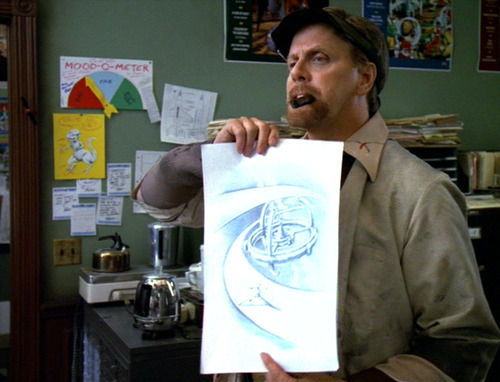
On his way home, Benny has a run-in with two cops, played by Marc Alaimo and Jeffrey Coombs. It’s a purposefully uncomfortable situation as the cops are suspicious of where he got his nice suit and why he’s working in such a nice building.
Next, he runs into a street preacher (Joseph Sisko), who calls out to him and tells him to “write the words that will set men free.”

Back in his apartment, Benny sits down at his typewriter and starts writing about Captain Sisko.
The next morning he goes to the nearby diner for breakfast, practically dancing about writing such a great story. We meet Cassie (Kasidy), who works at the diner and and wants to marry Benny and buy the diner. Just then, the ball-player, Willie (Michael Dorn) comes in. He makes a pass at Cassie and tells her to lose Benny, but she’s having none of it.
She does ask him why he’s still living uptown when he’s so famous now.
Willie: They can hardly get used to the idea of me playing alongside them. Living next to them? That’s a whole other story. Besides, around here, when people look at me, it’s ’cause they admire me. There, I’m just another coloured boy who can hit a curve ball. Now, if you will excuse me, my public awaits.
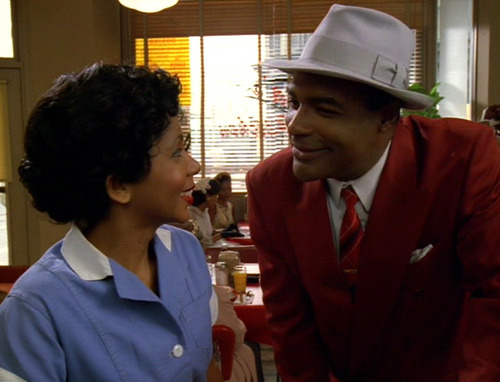
Next, Jimmy (Cirroc Lofton) comes in and tries to sell Benny a clearly-stolen watch. More great writing here, very quickly addressing the issue of the lack of real, meaningful jobs for young black men.
Benny: Why don’t you get a job?
Jimmy: As what? A delivery boy or a dishwasher? No, thanks. I like being my own boss, setting my own hours.
Benny: Sounds like a great life.
Jimmy: Yours ain’t no better. Writing stories about a bunch of white people living on the moon. Who cares about that?
Benny: I’m not doing that anymore. I’m writing about us.
In the office a bit later, everyone loves Benny’s story, including Darlene. Dax as Darlene is the only character in this I have mixed feelings about. She’s obviously there to be funny, just like Miles as Albert, but the ditz thing from Dax is a bit hard to reconcile.
But it’s great when Kay (who briefly flashes to look like Kira again) says she likes how tough the Major character is, and says, “Science fiction needs more strong women characters. I’m always saying that, aren’t I, Jules?”
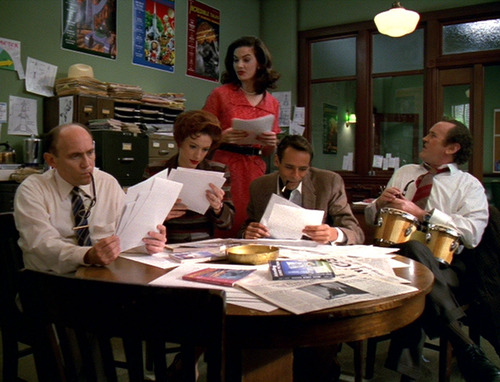
Then Douglas comes in and harshes the buzz:
Douglas: It’s good. It’s very good. But you know I can’t print it.
Benny: Why not?
Douglas: Oh, come on, Benny. Your hero’s a Negro captain. The head of a space station, for Christ’s sake.
Benny: What’s wrong with that?
Douglas: People won’t accept it. It’s not believable.
Herb: And men from Mars are?
This whole scene is wonderfully-written. It packs in so many details, including Douglas’ red-baiting Herb after he continues to object to the editorial call. Douglas eventually tells Benny he has to make the Captain white or scrap the story.
Benny goes to the diner to mope. Cassie says maybe this means he can quit writing finally. Jimmy says Benny was wasting his time: “Today or a hundred years from now – it don’t make a bit of difference. As far as they’re concerned we’ll always be niggers.”

But Benny still believes things will get better and as he heads out into the street, the street preacher seems to speak to these thoughts, again encouraging him to “write the words”.
He goes home and keeps writing more stories about Captain Sisko, until he falls asleep. He’s woken later by Cassie – he forgot they had a date.
Cassie: Ben Sisko? Isn’t that your coloured captain? Why are you writing another one of those stories. You couldn’t sell the last one. What makes you think this one’ll be any different?
Benny: It probably won’t be, but it doesn’t matter. It’s what I’ve got to do.
They dance in his apartment and he suddenly flashes to Deep Space Nine, where he’s with Kasidy. Then he’s back in the 1950s. He tells Cassie he thinks he’s losing his mind, seeing things from his story.
The next day at work Albert has the idea that Benny publish the stories as if they’re a dream by someone today, a young black man in a bad situation. Douglas thinks it might work.
Benny runs over to the diner to tell Cassie the good news and invite her out dancing to celebrate.
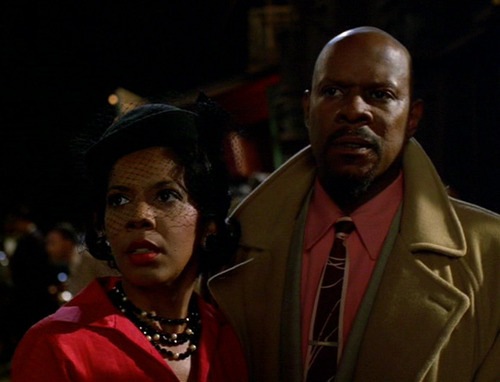
As they come out of the dance club, they hear gunshots and find the two detectives from earlier have gunned down Jimmy. Benny runs over and tries to get close to the body. The cops say he was breaking into a car and Benny yells at them. They try to pull him away from the body but he hits them. Both the cops hit back and beat him and kick him long after he’s done being able to defend himself.
I hope I wasn’t the only one who watched this scene with the heartbreaking knowledge that this scene could’ve been set today and been totally believable.
The next scene is in Benny’s apartment, where Cassie is worrying over him heading back to the office for the first time since being assaulted. But he wants to go in and see his story in print.
When Douglas comes in, though, it’s clear there’s bad news. He says the whole run had to be pulped because the magazine owner didn’t want Benny’s story in it. Plus, he’s also firing Benny.
Cue the epic meltdown.
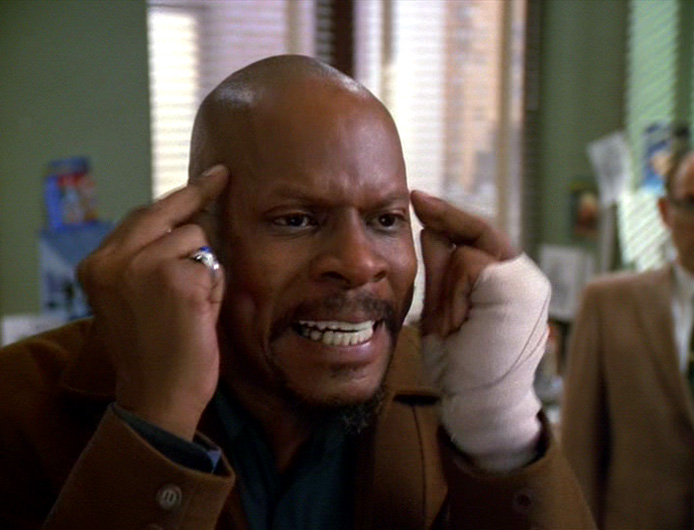
I’ve read critiques of this episode that say Avery Brooks overacted this scene. I say, how the hell would you react? Someone being in the situation Benny’s character in deserves to have at least that reaction.
“I’m tired of being calm. Calm never got me a damn thing,” he says.
Then, “You can pulp a story but you cannot destroy an idea.”
He collapses, inconsolable and we see him soon being wheeled out in a stretcher to an ambulance. In the ambulance the preacher appears again and tells him, “You are the dreamer and the dream.”
Sisko wakes up in the infimary and Bashir says his neural patterns have returned to normal. He was only out for a few minutes.
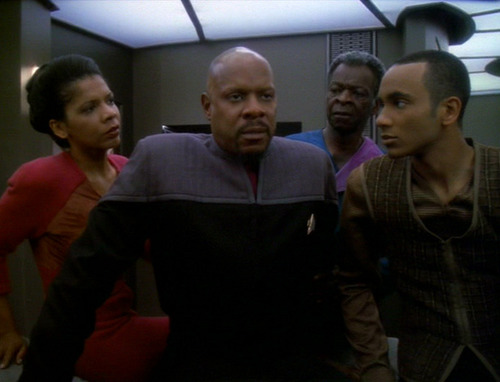
At the end, Joseph Sisko comes in to his son’s quarters to say goodbye before heading back to Earth. Ben is sure again that he needs to stay in his role on DS9, but is pondering something deeper.
“Maybe, just maybe, Benny isn’t the dream, we are. Maybe we’re nothing more than figments of his imagination. For all we know, at this very moment, somewhere far beyond all those distant stars, Benny Russell is dreaming of us.”
I think it’s important that Avery Brooks directed this episode – that was partly a decision by the producers that it shouldn’t totally come from a group of white guys who have never lived racism.
Brooks himself has said on the episode: “If we had changed the people’s clothes, this story could be about right now. What’s insidious about racism is that it is unconscious.”
I think “Far Beyond the Stars” shows that really well, particularly through Douglas’ character. Hopefully it also helps the audience reflect on their own unconscious beliefs, as well as on the importance of a truly inclusive vision of the future.
Bechdel-Wallace Test: Fail







